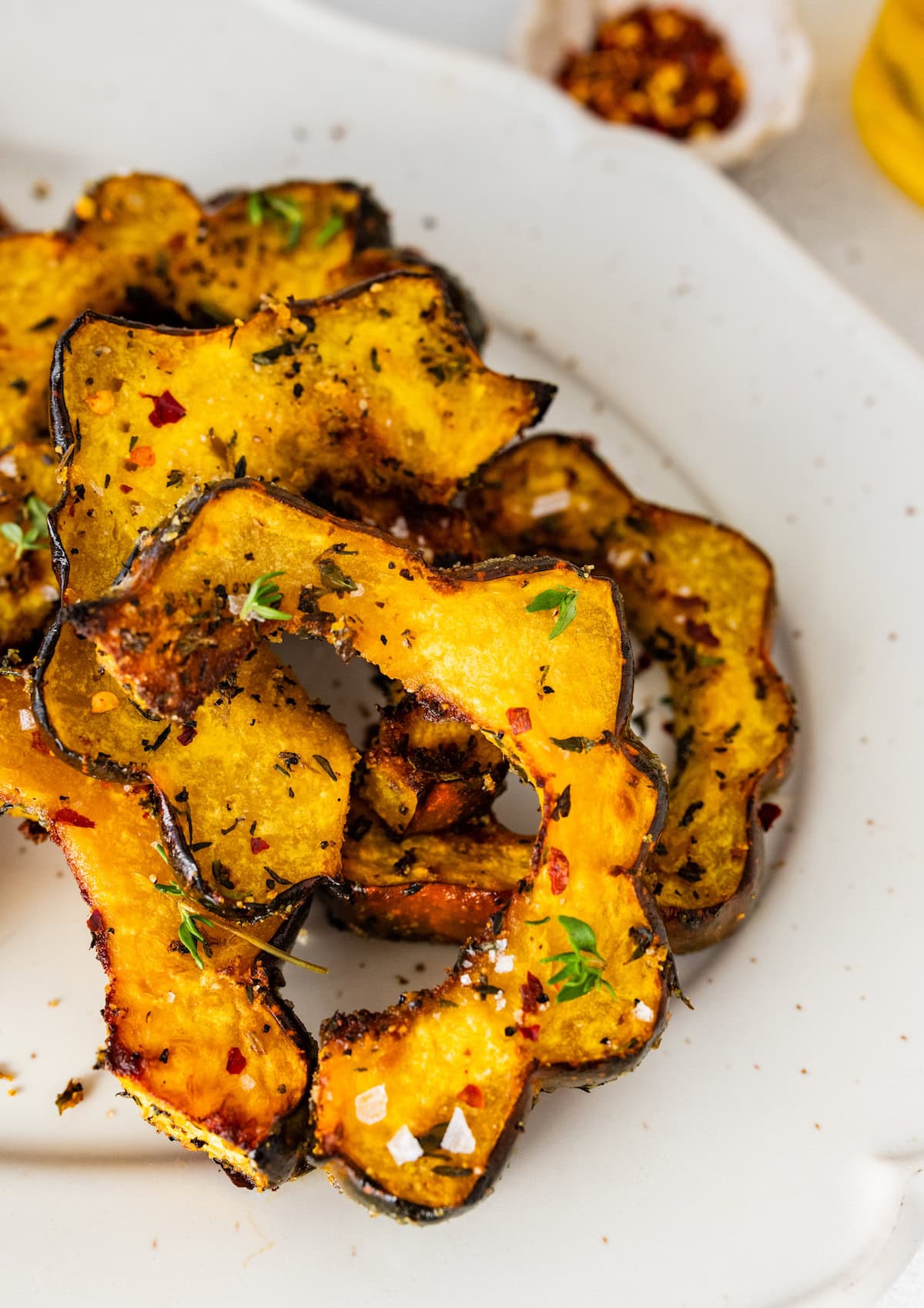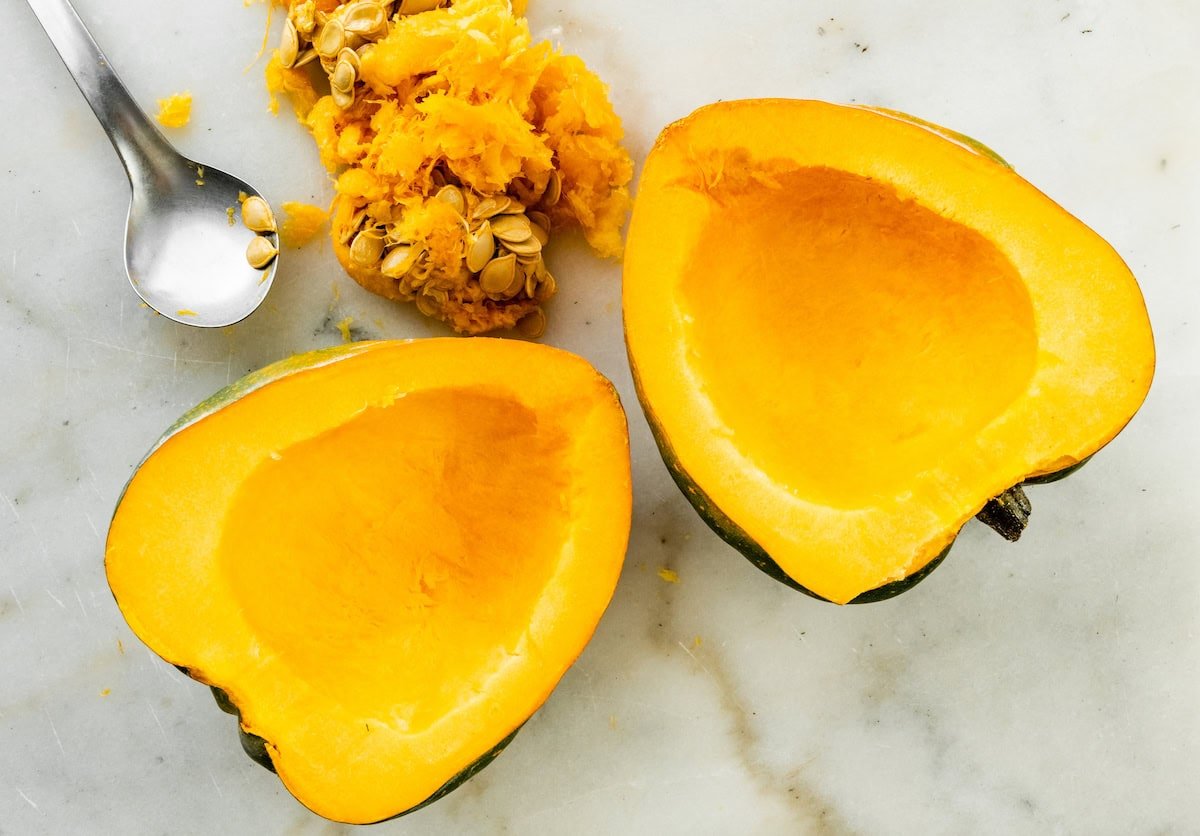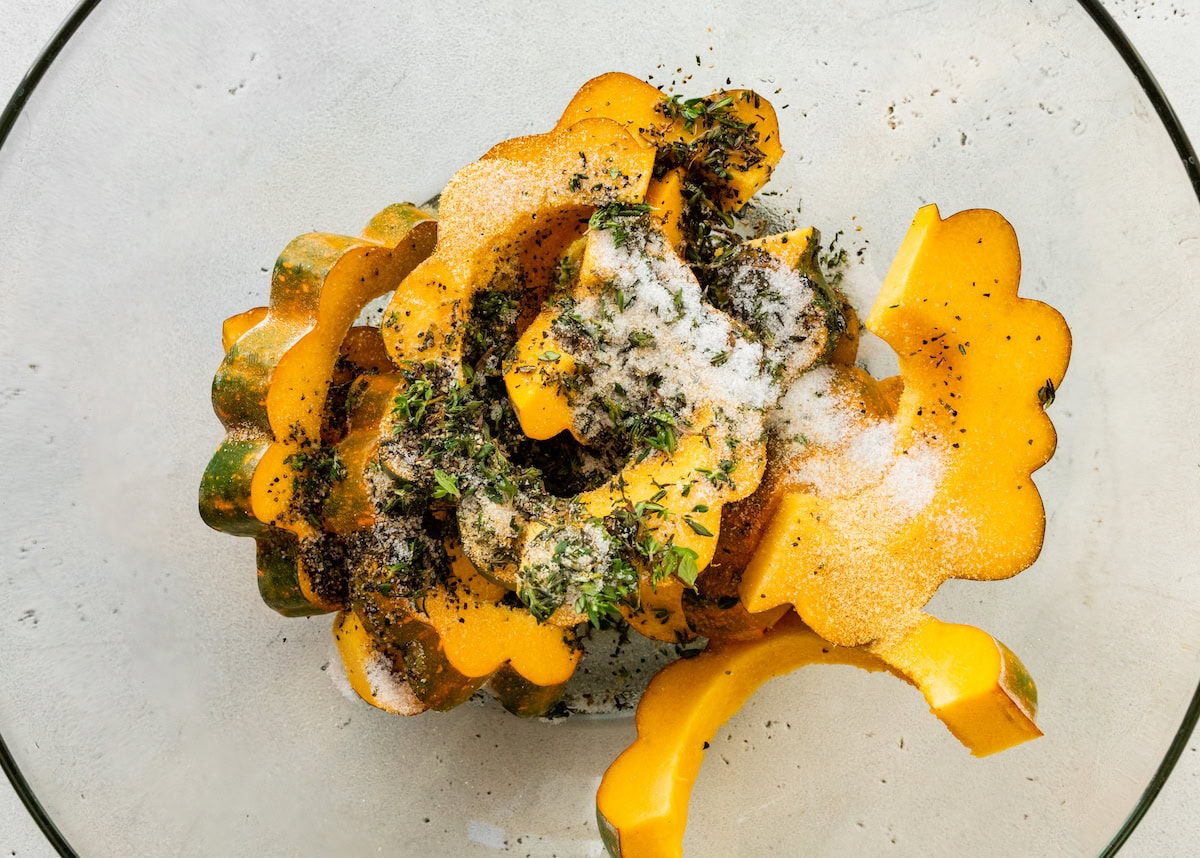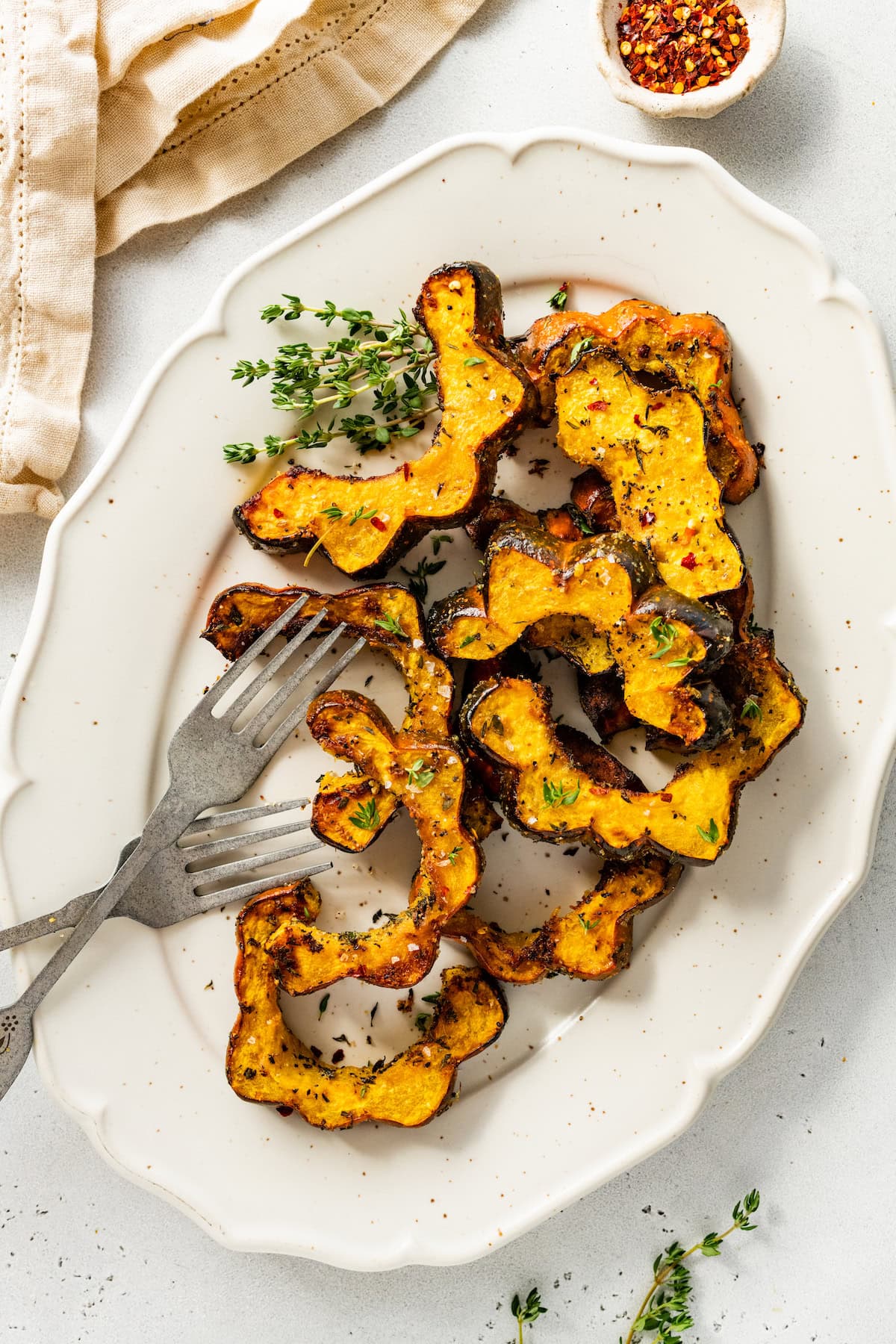Make the best roasted acorn squash with this simple recipe. It’s easy to make and the perfect fall side for weeknight dinners or the holidays.

I’ve never met a squash I didn’t like and lately I’ve been on a roll with all the winter squash recipes. There are just so many different varieties and ways to prepare squash… it’s been fun to experiment. My latest winter squash adventure was with acorn squash.
Acorn squash is often served as a sweet dish, usually steamed in the oven with butter, cinnamon and some sort of sugar. I love it like this for acorn squash yogurt bowls, but my favorite way to enjoy acorn squash is by slicing it and roasting it up with savory seasonings. With roasting, the texture of the squash feels a bit more dense (less stringy), the squash is more flavorful and the skin gets nice and soft.
Why You’ll Love This Recipe
- Perfectly Crispy & Tender – Roasting acorn squash brings out its natural sweetness while making the edges golden and crispy. The texture is incredible—soft and flavorful on the inside, with just the right amount of crunch on the outside!
- Healthy and Nourishing – Acorn squash is packed with fiber, vitamins, and minerals.
- Easy and Versatile – With just a few ingredients, this roasted acorn squash is super simple to make. Plus, you can switch up the flavors by adding different herbs or spices.
- Perfect Side Dish – Whether you’re serving it at a holiday gathering or just as a weeknight side, this roasted acorn squash is sure to impress. It’s great on its own or tossed into salads, grain bowls, or even served alongside your favorite protein.
Roasted Acorn Squash Ingredients

- acorn squash – look for a medium-sized acorn squash with no soft spots. It’s a great fall vegetable, naturally sweet and tender when roasted.
- olive or avocado oil – helps the squash get golden and crispy in the oven. Either oil works great!
- sea salt & pepper –basic seasonings to enhance the natural flavors of the squash.
- garlic granules (or garlic powder) – adds a savory, garlicky flavor that pairs perfectly with the sweetness of the squash.
- fresh thyme – brings a fresh, herby touch to the dish. You can also use other herbs like rosemary or sage for a different flavor.
- crushed red pepper (optional) –iIf you like a bit of heat, sprinkle some crushed red pepper over the roasted squash for a little kick!
Flavor Variations
One of my favorite things about squash is that you can take the flavor any direction you want! It’s naturally sweeter so pairs well with sweet options but also pairs well with savory and spicy seasonings. Here are some different variations to try out!
- Spicy roasted – Season squash with 1 tablespoon of olive oil, 1/2 teaspoon chili powder, 1/4 teaspoon smoked paprika and a pinch of crushed red pepper flakes. After baking, add a squeeze of lime juice for an extra kick!
- Maple roasted – Season squash with 1 tablespoon of maple syrup, 1 tablespoon of olive oil and a sprinkle of salt and pepper.
- Other sweet options – Coat squash with coconut oil and then sprinkle with 1 teaspoon of coconut sugar or brown sugar. Yum!
How to Make Roasted Acorn Squash

Step 1: Wash and dry your acorn squash. Cut the squash in half from top to bottom, just beside the stem. Use a spoon to remove the seeds and stringy innards from both halves.

Step 2: Cut off the tough stems (from the top and bottom of the squash), peel the squash if desired and then cut into 1″ thick slices.

Step 3: Place the acorn squash in a large bowl. Add the oil, salt, pepper, garlic and thyme. Toss to coat the squash.

Step 4: Arrange squash on a rimmed sheet pan, making sure the squash isn’t overlapping. Roast at 400ºF for 40 minutes. Flip each slice over around the 20 minute mark, then bake for an additional 20 minutes or until the squash is soft and golden. Sprinkle with crushed red pepper, flaked sea salt and more fresh thyme before serving if desired.
Brittany’s Tip
One thing I’ve found that makes a huge difference when roasting acorn squash is making sure the slices are evenly coated with oil and spaced out on the baking sheet. It’s tempting to crowd the pan, but trust me—giving each piece some room lets them get perfectly crispy on the edges!

How to Serve
- As a Side – This roasted acorn squash makes a perfect side for just about any meal, especially during fall and winter. It pairs beautifully with roasted chicken, turkey, or even grilled fish. For a cozy dinner, serve it alongside healthy turkey chili.
- Tossed in a Salad – Add the roasted squash to a hearty salad with mixed greens, quinoa, and your favorite fall toppings like dried cranberries, walnuts, or goat cheese. A drizzle of balsamic vinaigrette pulls everything together.
- In a Grain Bowl – For a wholesome, filling meal, toss the squash into a grain bowl with farro, quinoa, or brown rice. Top with protein like chicken or tofu, and finish with a tangy dressing like my tahini dressing.
- As a Snack – These roasted squash slices are great as a healthy snack on their own. I love to sprinkle a little flaked sea salt and crushed red pepper for extra flavor and enjoy them warm or cold.
- In a Holiday Spread – Roasted acorn squash is perfect for holiday meals! Serve it as part of your Thanksgiving or Christmas dinner, along with dishes like healthy mashed potatoes or roasted Brussels sprouts.
Frequently Asked Questions
Yes, you can technically eat the skin of acorn squash. It tends to get pretty soft and is quite easy to eat once roasted.
That said, I personally find the skin of acorn squash to be thicker and less enjoyable to eat than the skin of delicata squash or kabocha squash so I tend to take it off. The good news is that even if you don’t want to eat the skin, there’s no need to peel the squash before cooking because it easily peels right off after roasting. And to be honest, peeling an acorn squash before cooking is no easy feet because of the ridges. That said, it’s totally possible to peel an acorn squash before cooking if you have the patience. If you know you want to peel it, you can always look for an acorn squash that doesn’t have deep ridges to make it easier.
As with most squashes, there are a variety of ways to cook acorn squash! You can steam it, bake it, roast it and even grill it! Depending on how you’re using it, each option can be good! I personally think it tastes best roasted so that’s the recipe I’m sharing here!
Roasted Veggies You’ll Love:
More Squash Recipes to Try:
If you enjoyed this recipe, please consider leaving a ⭐ star rating and let me know how it went in the 📝 comments below.
-
Preheat oven to 400 degrees F.
-
Wash and dry the acorn squash. Cut the squash in half from top to bottom, just beside the stem. Use a spoon to remove the seeds and stringy innards from both halves.
-
Cut off the tough stems (from the top and bottom of the squash) and then cut the squash into 1″ thick slices.
-
Place the acorn squash in a large bowl. Add oil, salt, pepper, garlic and thyme. Toss to coat squash.
-
Transfer squash to a rimmed sheet pan, making sure the squash isn’t overlapping.
-
Roast for 20 minutes, flip each slice over and bake for another 20 minutes, or until squash is soft and golden. Sprinkle with flaked sea salt, crushed red pepper and more fresh thyme before serving, if desired. Serve warm.
Serving: 1/2 of recipe | Calories: 150kcal | Carbohydrates: 23g | Protein: 2g | Fat: 7g | Saturated Fat: 1g | Polyunsaturated Fat: 6g | Sodium: 597mg | Fiber: 4g
Nutrition information is automatically calculated, so should only be used as an approximation.
